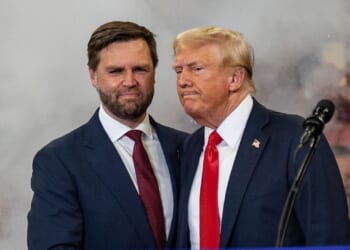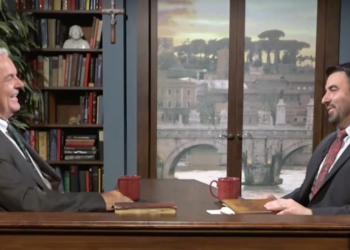Garvan Walshe is a former national and international security policy adviser to the Conservative Party. He runs Article7 – Intelligence for democrats.
The IMF meets this week amid signs that the global economy has become an emerging market, in the sense where an economy’s macroeconomic fate is subject to its domestic political instability.
The source of instability is Donald Trump’s particular combination of attacks on domestic political and legal institutions with a trade war against the whole world. These have alarmed traders, provoking climbdowns by Trump, only for those climbdowns to be reversed a few days later.
As I write, he has begun another climbdown, which stalled an Easter Monday market rout provoked by a statement by Trump that he would get rid of Jerome Powell, Chair of the Federal Reserve and replace him with someone more pliant (Trump is worried that Powell will raise interest rates to stop inflation caused by Trump’s tariffs, and tip the US into a recession). Nevertheless both stockmarkets and currency markets are down, beginning to reflect markets’ assessments that US economic institutions were decidedly weaker than they had thought.
The most notable effect has been in the currency markets. The US Dollar is the world’s reserve currency: a place investors put their money when they’re worried about the others. This gives the United States what the late French President Valery Giscard d’Estaing called “exorbitant privilege” . Other governments need to worry about issuing too much debt, in case they get caught out when the markets lose confidence in general economic conditions. Not so the United States. When markets were unstable, money flowed to the dollar and American government bonds. Or, at least until the last two weeks, it did.
Now, for the first time since free floating exchange rates were introduced, money simultaneously flowed out of the dollar and US treasuries. The interest rate the market demanded to take on US government debt rose (long run US government debt yields are now higher than those of Greece), while the dollar fell relative to other currencies. Trump announced he wouldn’t try to fire Powell, and the US escaped a currency crisis, for the moment, but its role as the anchor of global financial stability appears to be over.
Nothwithstanding the volatility that accompanies the dethroning of a reserve currency, issuers other good currencies tend to benefit, as we enter a period where reserve assets are more dispersed. Exorbitant privilege is being shared around a little. As well as gold and Swiss Francs, this time it is likely that the Eurozone and the Yen will take up some of the demand diverted away from the Dollar.
China’s Renminbi has the advantage of size it shares only with the Dollar and the Euro, but investors concerned about weak rule of law in Trump’s America will not necessarily be reassured on that front by Xi Jinping.
The question for the UK, as Chancellor Rachel Reeves attends the IMF meeting, should be how can it get hold of some of that reserve privilege, which would translate into lower government borrowing costs than otherwise possible, for Sterling?
The UK’s problem is not debt as a proportion of GDP, which at 96 per cent is lower than that of Italy, Japan, France, and, of course the United States (124 per cent), but that the UK has low growth prospects. In all but the shortest run, growth is a matter of productivity, which has been low in the UK for some time. It appeared to have risen in the boom preceding the financial crisis but that reflected excessively optimistic estimates of the productivity of the financial sector, that the crisis itself brought down to earth. Output per hour in the UK is at a level similar to that in Italy, and significantly behind France and Germany. It has been depressed by low levels of both public and private investment.
Here investment doesn’t mean “spending” (as much as politicians of all parties) claim it does, but spending for the purpose of increasing physical or human capital, that is spending which enables people to produce more output per hour in the future. The UK suffers from too much of its income being spent on land, through the prices attached to commercial and residential property, and not enough in business or infrastructure investment, or possibly, on educating its people.
This is mainly due to the dominance and success of London. Because London is such a brilliant economic engine, people flock there to live and work, pushing up property prices to almost the maximum conceivable figure, and handing a significant proportion of the value they create to the people who happened to own houses, offices or industrial property there beforehand. This does not, the exceptionally imaginative building conversions one sometimes comes across notwithstanding, lead to improvements in productivity. It is, to use economist’s jargon “unearned rent” that accrues to people who happened to be in the right place at the right time.
The IMF, were it to advise the Chancellor on where to efficiently find resources to boost growth in her economy, would suggest she tax it (as a country with oil reserves would tax their extraction). But Britain doesn’t tax property much, and to the extent that it does, council tax bands haven’t been revised since 1992, and business rates have proved a clumsy instrument.
Were such a reform to open up funds for productivity improvements, it could unlock some of the growth that would allow cheaper borrowing and a reduction in taxes on income or direct taxes like VAT. It is perhaps understandable that a Conservative government that depended on the support of wealthy home owners did not enact such reforms when it had the chance. Labour doesn’t seem to have the imagination to think otherwise.


![Trump Posts Hilarious Pope Meme, Leftists Immediately Melt Down [WATCH]](https://www.right2024.com/wp-content/uploads/2025/05/Trump-Posts-Hilarious-Pope-Meme-Leftists-Immediately-Melt-Down-WATCH-350x250.jpg)
![NYT Covered for Illegal Alien Accused of Raping a Corpse on NYC Subway [WATCH]](https://www.right2024.com/wp-content/uploads/2025/05/NYT-Covered-for-Illegal-Alien-Accused-of-Raping-a-Corpse-350x250.jpg)

![Tulsi Gabbard Opens Official Probe Into Fauci’s COVID19 Cover-Up [WATCH]](https://www.right2024.com/wp-content/uploads/2025/05/Tulsi-Gabbard-Opens-Official-Probe-Into-Faucis-COVID19-Cover-Up-WATCH-350x250.jpg)
![Vivek Gets Confronted by Protestor at GOP Event, Encounter Takes a Surprising Turn [WATCH]](https://www.right2024.com/wp-content/uploads/2025/04/Vivek-Gets-Confronted-by-Protestor-at-GOP-Event-Encounter-Takes-350x250.jpg)

![‘Liberal Sphincters Just Tightened’ [WATCH]](https://www.right2024.com/wp-content/uploads/2025/04/‘Liberal-Sphincters-Just-Tightened-WATCH-350x250.jpg)
![James Comer Hints at the Epic Behind-the-Scenes Effort Targeting the Deep State [WATCH]](https://www.right2024.com/wp-content/uploads/2025/04/James-Comer-Hints-at-the-Epic-Behind-the-Scenes-Effort-Targeting-the-350x250.jpg)





